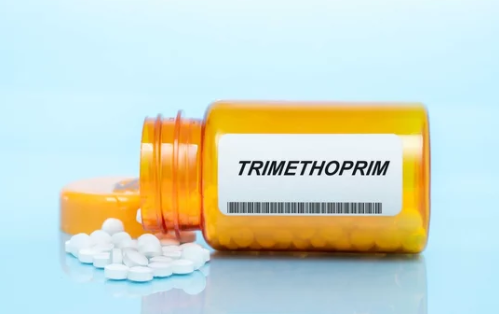Treating Cystitis with Trimethoprim



Cystitis refers to the inflammation of the bladder as a result of a previous bladder infection. It is one of the most common urinary tract infections (UTIs). Women who have smaller urethra compared to men commonly experience cystitis. A smaller urethra allows the bacteria to reach the bladder with a shorter travel distance. Cystitis is not usually a significant medical concern. Still, it may exhibit painful and discomforting symptoms such as dysuria (painful urination), increased frequency and urgency in urination, foul-smelling dark colour or cloudy urine, lower abdominal pain, general feeling of being unwell, nausea, and lethargy.
Most cases of cystitis are caused by naturally occurring bacteria in the gut or on the skin that enter the bladder through the urethra. Other causes of cystitis include sexual intercourse, back-to-front wiping after using the toilet, urinary catheters, pregnancy, a diaphragm for birth control, diabetes, and a weakened immune system.
Treatment for cystitis depends on the level of severity of the infection. Mild cystitis usually resolves on its own after a few days. Other cases involve cystitis recurring after treatment which requires long-term medical treatment. When left unmanaged, the infection can lead to more severe complications, such as kidney infections.
Trimethoprim tablets are antibiotic medications commonly prescribed for UTIs such as cystitis. Its standard treatment consists of taking 200mg of Trimethoprim twice daily for three days. These tablets are quick and effective in killing the bacteria that causes pain and other symptoms of cystitis. It is sometimes used to treat chest infections.
Trimethoprim was formerly the first-line treatment for UTIs before the guidelines provided by the National Institute of Health and Care Excellence as the causative bacteria of cystitis showed resistance to Trimethoprim.
Trimethoprim tablets are used to treat urinary tract infections and respiratory tract infections. Trimethoprim comes in tablet and liquid forms and is a broad-spectrum antibiotic that kills a wide range of bacteria and thus can be used to treat infections of many types.
Trimethoprim prevents bacteria from producing the folic acid they need to survive. Folic acid supports DNA production in bacteria. Their DNA helps them grow and reproduce, and they cannot do so without folic acid. This helps to clear the infection. For most conditions, most people feel better within a few days of taking Trimethoprim.
Trimethoprim tablets are available in 100mg and 200mg doses. The trimethoprim dose you will need will depend on your age, the infection, and how well your kidneys work. The usual dose for a UTI is 200mg twice a day, while the standard amount to prevent other infections is 100mg once daily.
Take the prescribed dose of Trimethoprim tablets precisely as directed by your doctor. For most adults, your doctor will usually prescribe 200mg twice daily. You may be prescribed 100mg at night for long-term treatment or to prevent recurrent urinary tract infections. When taking Trimethoprim, you should:
Swallow the tablets whole with a glass of water without chewing.
Take them at the same time each day.
Lower doses are usually given in older people who need Trimethoprim to treat urinary tract infections and who have kidney problems. In general, it is taken twice daily for infections (once in the morning and once in the evening). Other things to remember are:
You can take the medication with or without food
It takes several days before you can see the effects
You can drink alcohol while taking Trimethoprim
Trimethoprim is sold only in its generic form.
The course of Trimethoprim prescribed will entirely depend on the severity of your cystitis, age, and gender.
Women with uncomplicated urinary tract infections are usually prescribed a 3-day course of Trimethoprim
Men and pregnant women with uncomplicated UTIs are typically prescribed 14 days of Trimethoprim
Patients with severe or complicated UTIs are treated with a 14-day period of Trimethoprim
When forgetting or missing a dose, could you take it as soon as you remember? If your next dose is due, leave the missed dose and take your next dose as usual. Never take two doses simultaneously, and never take an extra dose to compensate for the missed dose. Taking an extra trimethoprim tablet will not harm you; however, it may increase the risk of temporary side effects.

Getting side effects from Trimethoprim is uncommon but not impossible. Some people get itching or a skin rash, which usually resolves after they stop taking medicine. Around 1 in 100 people experience common side effects of Trimethoprim. Visit your doctor or pharmacist should these side effects bother you for several days even after you stop taking the medicine:
Itching or a mild rash
Diarrhoea, headaches, and feeling or being sick (nausea or vomiting)
Meanwhile, rare serious side effects can happen in less than 1 in 1,000 people. Call a doctor or contact 111 straight away if you have the following:
Diarrhoea (possibly with stomach cramps) that contains blood or mucus
Severe diarrhoea that lasts more than four days
Unexplainable bruising or bleeding (including nosebleeds), a sore throat, mouth ulcers, a high temperature, or you feel tired or generally unwell can be signs of a problem with your blood.
In rare cases, it's possible to have a severe allergic reaction (anaphylaxis) to Trimethoprim.
Trimethoprim is a prescription medication that is not available over the counter. It would be best to have a prescription from a registered doctor before you can get it from a pharmacy. You can buy Trimethoprim online, but it is not the most advisable way of purchasing. Before you buy any medication online, you should ensure that the store you are buying from is registered with the General Pharmaceutical Council (GPhC). If not, chances are they are operating illegally. If the purchase is successful, read the patient information leaflet carefully.
You should not take Trimethoprim if you:
Have a history of allergic reactions to Trimethoprim or any other medicine
Have liver or kidney problems
Have anaemia or low amounts of folic acid (folate) in your blood
Have porphyria (a rare inherited blood disorder) or any other blood disorders
Are trying to get pregnant or are already pregnant
Taking trimethoprim tablets or their liquid form while breastfeeding is perfectly safe. Only a minimal amount of the Trimethoprim passes to the baby in breast milk. If you are breastfeeding and are worried about the effect of Trimethoprim, you should speak with your doctor.
No foods or alcohol affects Trimethoprim. They neither cause antibiotic resistance nor reaction if you consume them while taking your prescription. Trimethoprim tablets can also be safely taken with other over-the-counter remedies to treat UTIs, such as Cymalon and Cystopurin, which help reduce the urine's acidity. You can also take simple painkillers (Paracetamol and Ibuprofen) alongside Trimethoprim. Taking Trimethoprim tablets will also not stop your birth control medication (contraceptive pill) from working.
Trimethoprim does not mix well with several drugs, including:
Blood thinners such as warfarin
Bone marrow depressants
Digoxin (used to treat heart problems)
Diuretics (water tablets) and other high-blood pressure medicines
Repaglinide and pioglitazone (to treat diabetes)
Rifampicin (a type of antibiotic)
Some anticonvulsants, such as phenytoin (epilepsy medication)
Some malaria tablets
You should inform your doctors if you are taking any medication as it may interact with Trimethoprim.
Treating UTIs, including bacterial infections and recurrent infections, is not necessarily via medications such as the prescribed Trimethoprim. The following are proven tips for getting rid of bladder infection naturally:
Plenty of water
Cranberry juice
Garlic
Probiotics
Minimal intake of caffeine, alcohol, and spicy foods
abstinence from sex
Fewer carbs, sugar, and preservatives
Warm bubble baths
The treatment for urinary tract infections with trimethoprim is effective because it inhibits the growth of bacteria by lowering the amount of folic acid they produce.
UTI Treatment with Trimethoprim is a highly efficient antibiotic that can stop the multiplication of the bacteria that is the root cause of the infection.
Find our trimethoprim medicine here.
To get more information about a urinary tract infection or where to buy Trimethoprim online, visit our women's health hub by clicking here.










Plus get the inside scoop on our latest content and updates in our monthly newsletter.